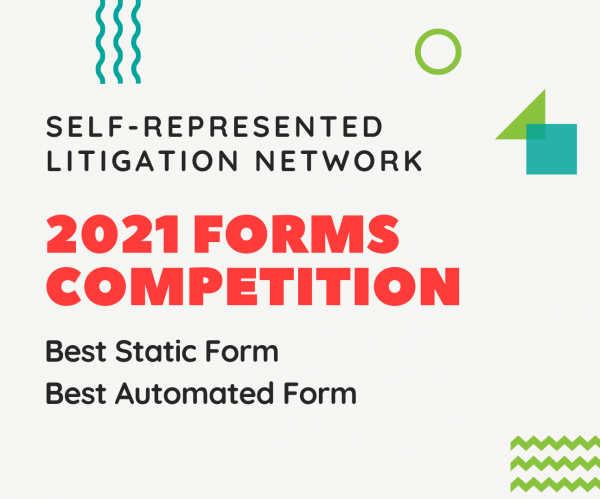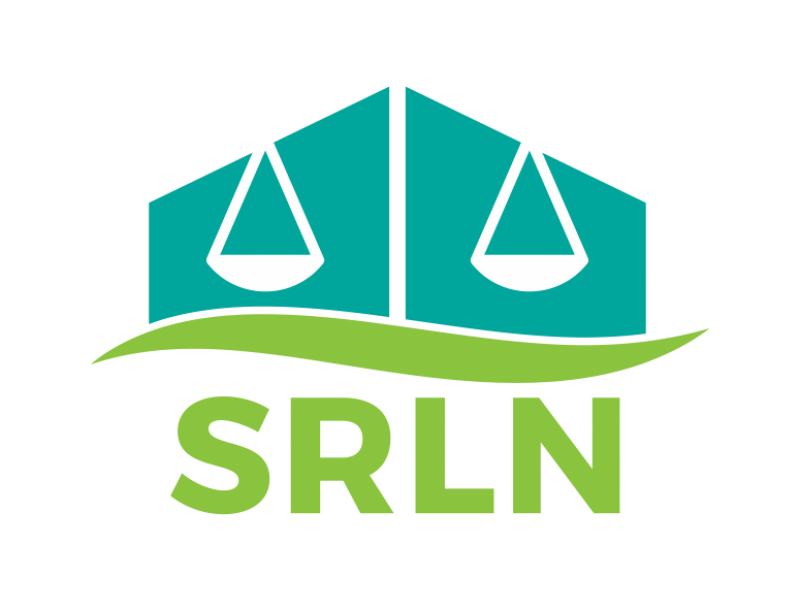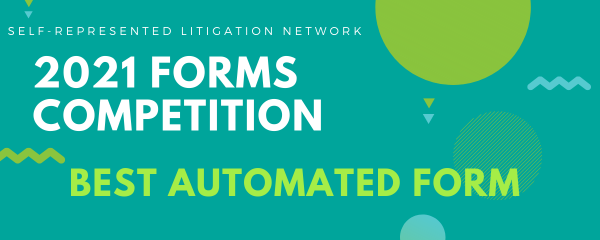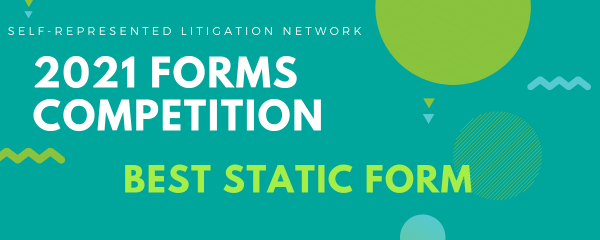SRLN 2021 Forms Competition

A giant congratulations to our SRLN 2021 Forms Competition Winners!
Automated Forms Category: UMKC School of Law, Bloch Law Library
Static Forms Category: Minnesota State Court Administrator's Office
About the 2021 Forms Competition
The Self-Represented Litigation Network hosted the 2021 Forms Competition between April and May 2021. In 2017 the SRLN Forms & Technology Working Group held its first ever Forms Competition. Courts, legal aid organizations, and their community partners endeavored over the last year to put up remote services for communities navigating the legal process, and forms like these were foundational to that work.
Please join us in celebrating our contestants and our winners, who all created forms responsive to the needs of their jurisdiction. Below we have highlighted trends across our 19 contestants, as well as fun facts about the composition of our competition. See the SRLN 2017 Forms Competition page for details about the 2017 competition.
View the SRLN 2021 Forms Competition Recording
Contestant Materials
Special Note: if you are testing forms please ensure you do not submit or file a form you do not intend to.
|
Contestant Organization |
Category |
Link to Submission (Interview Software Used) |
|
Community Legal Services of Mid Florida |
Automated |
Landlord-Tenant - Emergency Motion to Stay Eviction* * This form is used by staff as part of the organizations case management software. The interview guides staff and assists in creating the form included below. |
|
Illinois Legal Aid Online |
Automated |
|
|
Iowa Judicial Branch |
Automated |
|
|
Lagniappe Law Lab |
Automated |
|
|
Legal Aid Center of Southern Nevada |
Automated |
Landlord-Tenant - Tenant's Answer to Summary Eviction (Odyssey Guide & File) |
|
Michigan Legal Help Program |
Automated |
General Civil - Application to Set Aside Conviction (LawHelp Interactive) |
|
Northwest Justice Project |
Automated |
|
|
Ohio Legal Help |
Automated |
|
|
Suffolk Law School |
Automated |
Domestic Violence - Application for 209A Restraining Order (Docassemble) |
|
Tennessee Alliance for Legal Services |
Automated |
|
|
UMKC School of Law, Bloch Law Library |
Automated Category Winner |
|
|
State of Nebraska Administrative Office of the Courts and Probation |
Static |
|
|
Alaska Court System |
Static |
Consumer Debt - Answer to Counterclaim to Complaint to Collect a Debt |
|
Indiana Legal Servces |
Static |
|
|
Baltimore County Circuit Court Law Library |
Static |
|
|
Colorado Courts |
Static |
|
|
Ottawa County Legal Self-Help Center |
Static |
|
|
King County Law Library |
Static |
|
|
Minnesota State Court Administrator's Office |
Static Category Winner |
Fun Facts about Contestants
|
States represented in the competition |
Alaska, Colorado, Florida, Iowa, Illinois, Indiana, Louisiana, Massachusetts, Maryland, Michigan, Minnesota, Missouri, Nebraska, Nevada, Ohio, Tennessee, and Washington |
|
Case types covered by contestant forms |
General Civil: Administrative, Fee Waivers, Probate, Name & Gender Marker Change, Expungement, Workers Compensation Family Law Domestic Violence Consumer Debt Landlord-Tenant Guardianship |
|
Languages other than English |
Spanish (most common), Somali, Vietnamese, Portugese, Chinese (simplified) |
Obstacles contestants overcame and solutions they deployed:
|
Obstacles identified |
|
|
Solutions deployed |
|
|
User Testing approaches |
|
|
Maintaining updated forms |
|
Competition Details
Competition Categories
- Best Static Form - stand alone forms, print or digital, that self-represented litigants can download and use.
- Best Automated Form - forms produced from a type of guided interview, such as software like A2J Author, LawHelp Interactive, Guide & File, Documate, AfterPattern, and others.
The competition was limited to court, legal aid, non-profit or government organizations providing these forms to self-represented litigants.
Assessment Criteria
Judges will use the following components to assess submissions:
- Comprehensibility - does the form deploy plain language? Does the form provide adequate information? Is its purpose clear? Are any accompanying instructions clear?
- Design - is the form user friendly?
- Navigability - can the form be navigated by the intended audience?
- Service Integration - how well does the form fit within an existing process?
Judges will consider the effectiveness of the form as it is accessed by a user – this includes any accompanying instructions to static forms and the quality of automated interviews. The most important criteria is plain language comprehensibility.
Winner Awards
Winners received one free admission to the next in-person SRLN Conference.


